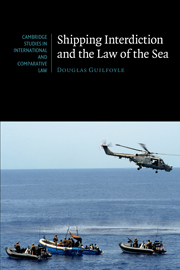Book contents
- Frontmatter
- Contents
- Foreword
- Preface
- Acknowledgements
- List of abbreviations
- Table of treaties and other international agreements
- Table of cases
- PART I General principles
- PART II Interdiction and maritime policing
- PART III The general law of interdiction
- 10 Interdiction: modalities and international law standards
- 11 National jurisdiction and immunities during interdictions
- 12 International responsibility and settlement of claims
- 13 General conclusions: a law of interdiction?
- Select bibliography
- Index
- CAMBRIDGE STUDIES IN INTERNATIONAL AND COMPARATIVE LAW
12 - International responsibility and settlement of claims
Published online by Cambridge University Press: 11 September 2009
- Frontmatter
- Contents
- Foreword
- Preface
- Acknowledgements
- List of abbreviations
- Table of treaties and other international agreements
- Table of cases
- PART I General principles
- PART II Interdiction and maritime policing
- PART III The general law of interdiction
- 10 Interdiction: modalities and international law standards
- 11 National jurisdiction and immunities during interdictions
- 12 International responsibility and settlement of claims
- 13 General conclusions: a law of interdiction?
- Select bibliography
- Index
- CAMBRIDGE STUDIES IN INTERNATIONAL AND COMPARATIVE LAW
Summary
Liability: applicable standards and diplomatic protection
Under general international law an interdicting state is obliged to compensate a boarded vessel for any loss, damage, injury or delay arising from wrongful boarding and inspection. This is a separate obligation from any responsibility to the flag state for unjustified interference with a vessel bearing its nationality. The procedure to be followed and the standard of assessment and quantification of loss to be applied might be thought to be more controversial. SOFAs usually embody a claims procedure under which the receiving state will process claims for compensation arising out of acts committed by visiting forces and will then receive a partial indemnity from the sending state under a cost-sharing formula. A similar approach is taken under European treaties dealing with cross-border police activities. It would be hard to say, however, that any such pre-agreed formula evidenced a general rule that responsibility lies with the receiving (or flag) state to settle claims arising from consensual interdictions. Such rules are better considered a lex specialis displacing the ordinary rules of diplomatic protection or state immunity which might apply in such cases. In any event, there is no need to turn to analogies regarding visiting forces or cross-border policing when there are applicable rules of the law of the sea dealing with losses incurred during an interdiction.
Where an interdiction has been conducted upon the suspicion that one of the legal grounds under UNCLOS Article 110(1) exists, Article 110(3) further provides:
If the suspicions prove to be unfounded, and provided that the ship boarded has not committed any act justifying them, it shall be compensated for any loss or damage that may have been sustained.
- Type
- Chapter
- Information
- Shipping Interdiction and the Law of the Sea , pp. 324 - 338Publisher: Cambridge University PressPrint publication year: 2009

